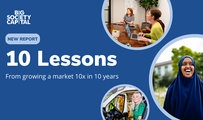Introducing myself
I am delighted to have recently become Chair of Big Society Capital and to be joining at such an exciting moment – when it is celebrating its first ten, highly successful, years and is set to have greater and greater influence as social impact investment becomes increasingly mainstream. It is also an honour to have taken over from Harvey McGrath and to be riding on the shoulders of Ronnie Cohen.
I have recently stepped down from chairing the board of an investment company and also bring direct experience in fund management, where I have worked for all of my career, plus some understanding of the third sector, having been a charity trustee for over twenty years. I also hope my work as a business coach will be helpful to my role at Big Society Capital as I believe I am a better non-executive director because I am a coach, and a better coach because I am a non-executive director.
My background in financial services might suggest to some that I am a ‘red blooded’ capitalist. That is not the case. Mimicking Winston Churchill, I believe market capitalism is the worst economic system – except for all the others that have been tried. Capitalism is far from perfect and, for it to be sustainable, it must work for all stakeholders - and be demonstrably fair. That was a minority view until recently and I became used to often being a lone voice on the topic. That has now changed, and I believe it has changed permanently - and for the better - providing a brilliant opportunity for social impact investment.
First impressions
I joined Big Society Capital with high expectations – its reputation preceded it. But my expectations have been exceeded. The scope of what we do, the quality of the partnerships we have and, particularly, the quality of the team at Big Society Capital are all beyond what I anticipated. The need for social enterprise is virtually limitless and, although what we offer will never be suitable for all organisations, the range of social issues we have impact upon is enormous. There is, of course, more we can, and will, do, but for the sector, supported by Big Society Capital, to have achieved what it has to date is incredibly impressive and should be celebrated.
I am plagiarising my predecessor when I note that many of the staff of Big Society Capital are half my age and at least twice as talented. To have assembled a team of such high quality and wide diversity with very strong commitment to what we do is a huge achievement. Growing and nurturing the team will not get any easier as the sector grows and more organisations adopt impact investment approaches but maintaining Big Society Capital's reputation as an outstanding place to work will be my highest priority during my time as Chair.
The future
I am too new at Big Society Capital and still have too much to learn about social impact investing to be able to propound a vision for Big Society Capital's second ten years, let alone the sector’s future. Nevertheless, it is clear to me that both the need and the opportunity for social impact investment in the UK have never been greater and that we are therefore witnessing an exciting confluence of powerful forces.
The widening of social inequality over the past forty years, the more recent hardship caused by the Covid pandemic, and the current cost of living crisis mean that there will, very sadly, be no shortage of social issues requiring attention and capital. Although social impact investment will not be suitable or appropriate in all instances, there will be a portion where it will potentially be an important part of the solution.
What is different now from previous economic and social crises is that the supply of private capital potentially available to alleviate some of the hardship and inequality has increased, growing nearly tenfold in the last ten years. The ranks of organisations seeking impact investment opportunities are exploding and specialist firms set up to undertake impact investment are being joined by mainstream institutions pivoting into it.
Mainstream firms are transitioning for a variety or combination of reasons – some out of deeply held and long-standing beliefs that have now become more widely accepted; some because their clients (pension funds, foundations, private clients) are seeking evidence of impact other than solely financial returns; and many because their existing and prospective staff are demanding it. The war for talented Millennials and Generation Zers in the investment industry is forcing firms to redefine what they do and how they do it in order to create and maintain employment advantage. Whatever the causation, the supply of capital looking for impact investing opportunities is increasing, and I believe this is now a well-established trend - and not a passing fad. I think this is something to be embraced and celebrated.
So what?
Well, for one thing, I am very excited! More capital flowing into the sector means more opportunities for what we and our partners do. That is certainly true in social and affordable housing and in social lending where Big Society Capital already has significant capital employed. Meanwhile, I believe two of the areas I am most enthused about will also thrive. I hope governments at all levels and of all complexions will look at social outcomes contracts (SOCs) more carefully and more positively in future - and Big Society Capital's recent data on the impact returns available from social outcomes contracts should prove to be very timely. Last, it is ironic that I should be particularly enthusiastic about impact in venture capital. Ironic because the majority of capital in this segment flows eventually into digital tech innovation - and I am a digital dinosaur. But even I can appreciate that the potential (and the current reality) for digitisation to have huge and meaningful positive impact on currently disadvantaged groups is enormous – and must be harnessed.
I rarely attempt to foretell the future. Nevertheless, I am sure of two things about the future of social impact investment. First, the prospects for it have never been more exciting. But second, the sector’s future will be decided by its ability to do what it ‘says on the tin’ over the next three to five years – delivering both meaningful social impact and sustainable financial returns over complete economic cycles remains critical.









